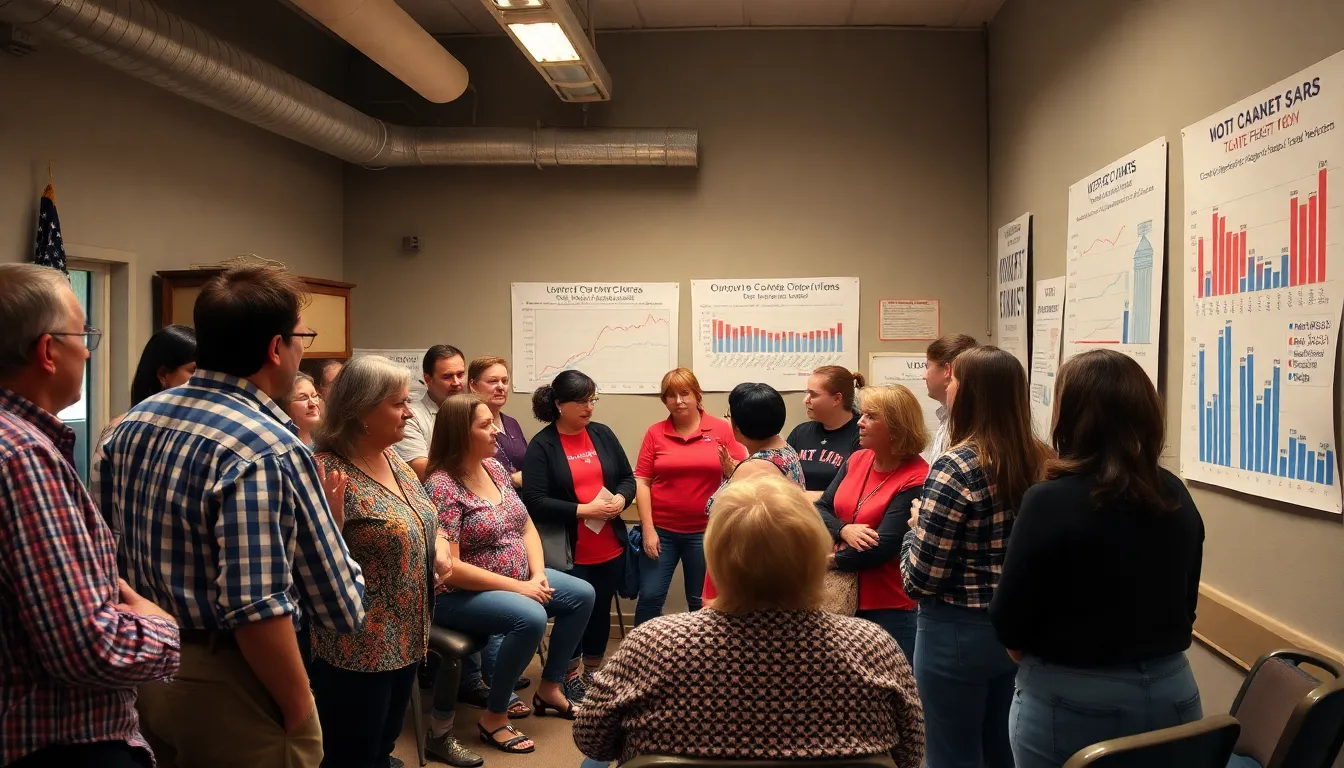In a world where political opinions fly faster than a cat meme on social media, understanding political evaluations is more crucial than ever. These assessments help individuals navigate the complex landscape of policies and personalities, turning confusion into clarity. Imagine trying to decipher a politician’s promises without a roadmap—it’s like attempting to assemble IKEA furniture without the instructions.
Political evaluations provide that much-needed guidance, allowing voters to make informed decisions. They sift through the noise, highlight the facts, and even sprinkle in a bit of humor to keep things engaging. After all, politics doesn’t have to be all doom and gloom. With the right tools, anyone can become a savvy political analyst, ready to tackle the next election with confidence and maybe a chuckle or two.
Table of Contents
ToggleUnderstanding Political Evaluations
Political evaluations serve as a crucial tool for navigating the complexities of political landscapes. These assessments clarify political promises and their implications, empowering voters to make informed choices.
Definition of Political Evaluations
Political evaluations involve systematic assessments of political actors, policies, and institutions. They aim to analyze effectiveness, accountability, and public opinion. Such evaluations often rely on quantitative and qualitative data to gauge citizens’ perceptions. For example, surveys might measure approval ratings or satisfaction with government performance. In essence, political evaluations provide a framework to understand political dynamics and predict electoral outcomes.
Importance in Political Science
Political evaluations play a vital role in political science by offering insights into voter behavior and decision-making processes. Scholars utilize these evaluations to study trends, motivations, and the impact of policies. By examining evaluation results, researchers can identify factors that influence public opinion. These insights shape electoral strategies and inform policymakers about citizen needs. Ultimately, political evaluations contribute to the broader understanding of governance and democratic engagement.
Methods of Political Evaluations

Political evaluations employ diverse methods to analyze political phenomena. Using various approaches allows for a rounded understanding of political actors and policies.
Qualitative Methods
Qualitative methods focus on understanding behaviors and motivations in politics. Researchers often conduct interviews with voters or focus groups to gather in-depth insights. These conversations help reveal the context behind political opinions. Additionally, case studies examine political events or policies over time, highlighting trends and outcomes. Expert analyses of speeches or debates can bring clarity to candidates’ positions and public sentiments as well.
Quantitative Methods
Quantitative methods rely on numerical data to assess political scenarios. Surveys and polls capture large-scale opinions, providing statistically significant findings. Researchers often use data analysis tools to interpret results accurately. This method enables comparisons across different demographic groups and regions. Election results and voting patterns serve as crucial datasets, allowing for predictive modeling in subsequent elections. Ultimately, quantitative approaches enhance the understanding of electoral dynamics and public opinion trends.
Factors Influencing Political Evaluations
Political evaluations are impacted by various elements. Each factor plays a significant role in shaping how individuals perceive political issues and actors.
Media Influence
Media outlets are key players in shaping public perception. Coverage can frame issues, emphasizing certain aspects while downplaying others. News consumption patterns differ, with younger generations often relying on social media for political information. Trust in media sources varies among the public, affecting political evaluations. When mainstream media faces criticism, alternative outlets gain traction, influencing narratives. Consequently, the portrayal of candidates can sway voter opinions dramatically.
Public Opinion
Public opinion continuously shifts based on numerous factors. Polls reflect sentiments towards politicians, policies, and events, providing insights into voter preferences. Events such as debates, scandals, and crises can alter perceptions overnight. Additionally, groups of voters form based on shared beliefs, impacting how collective opinions shape electoral outcomes. Observing how public opinion evolves during campaigns reveals the dynamic political landscape. Consistent polling allows political analysts to anticipate potential shifts in voter behavior.
Social Identity
Social identity significantly influences individual political evaluations. Factors such as race, gender, and socioeconomic status create distinct political preferences and biases. Group memberships often align with specific party ideologies, further solidifying opinions among individuals. Shared experiences within social contexts can deepen partisan loyalty and heighten responsiveness to political messaging. Studies show that people often evaluate political actors through lenses constructed by their identities. These interactions ultimately shape broader voting patterns and engagement levels.
Applications of Political Evaluations
Political evaluations serve various purposes in the realm of governance and civic engagement. Understanding how these applications manifest enhances the appreciation of their significance.
Policy Analysis
Policy analysis leverages political evaluations to assess the effectiveness and impact of legislation. By examining data on outcomes, analysts determine whether policies achieve desired goals. Policymakers utilize these evaluations to refine existing policies and develop new initiatives that address public needs. Stakeholders gain insights from evaluations that reveal unintended consequences and overall effectiveness. Through this systematic analysis, the public learns about the implications of policy decisions, ultimately fostering accountability.
Electoral Processes
Electoral processes benefit significantly from political evaluations. Evaluations provide critical insights into voter behavior and preferences, aiding candidates in shaping their strategies. Understanding demographics through data analysis allows candidates to tailor their messages effectively. Political evaluations also highlight key issues that resonate with constituents, guiding campaign priorities. Furthermore, these assessments examine the effectiveness of electoral systems in reflecting public will. By analyzing voter turnout and engagement, political evaluations contribute to improving democratic participation and processes.
Political evaluations serve as essential tools for understanding the intricate dynamics of the political landscape. By offering clarity and insight into political actors and policies, they empower voters to make informed choices. The combination of qualitative and quantitative methods enriches the analysis of electoral behavior and public opinion.
As the political environment continues to evolve, the role of these evaluations becomes increasingly significant. They not only enhance democratic engagement but also inform policymakers about the needs and preferences of citizens. Ultimately, political evaluations are vital for fostering accountability and improving governance, ensuring that democracy remains responsive and effective in addressing public concerns.





